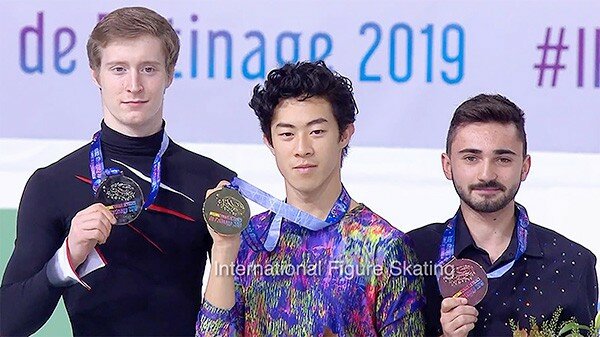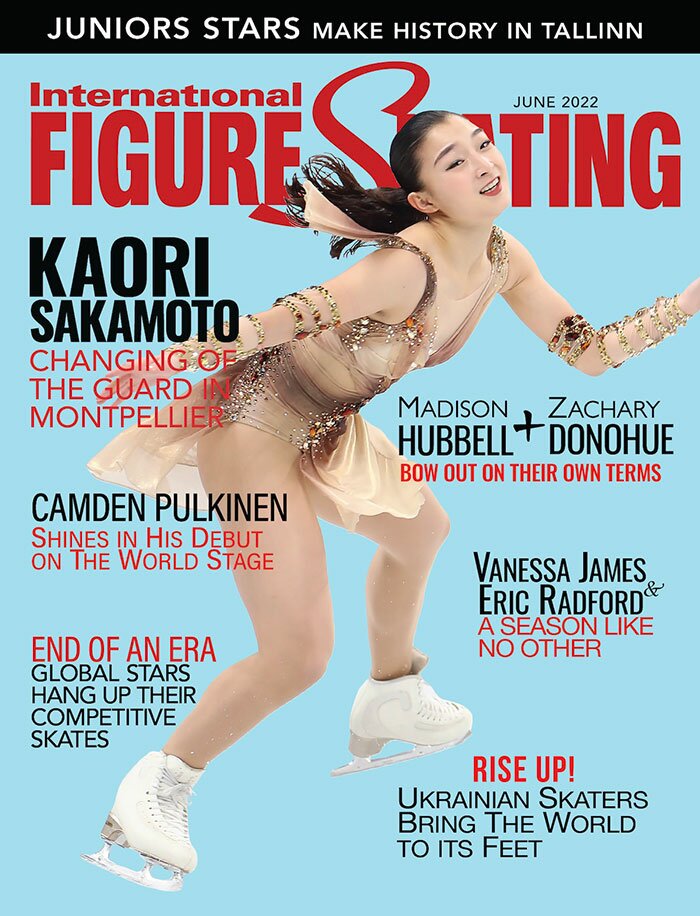

The men’s competition opened the second day of Internationaux de France, and it was one that most in the field were probably wishing they could do over again.
Nathan Chen scored a runaway victory at the French Grand Prix this weekend, capturing his second title of the season, and was the first skater to qualify for the Grand Prix Final. His presence in Torino, Italy, will mark his fourth consecutive appearance. It was not smooth sailing to the top of the podium for the 20-year-old, however. Though Chen executed four quads (Lutz, two toe loops — one in combination — and a Salchow) in his “Rocket Man” long program, as well as two triple Axels, some of his jumping passes were shaky on the landings and received negative GOEs (Grade of Execution).
Nonetheless, he was still far and away the best skater in the field, earning 194.68 points for the segment and a 297.16-point total to take the title by 32.06 points over the runner-up. Chen said he was satisfied with how both his Grand Prix events played out and was happy to qualify for the Final, but admitted that: “At both Skate America and in France I made a lot of silly errors, errors that I need to fix.”
Russia’s Alexander Samarin skated into second place overall, but it was a fight from start to finish in his “Good News” by Apashe long program. He opened the routine with a quad Lutz-triple toe loop combination, followed by a second toe loop, but things fell apart after that. Samarin fell on both the quad flip and the triple Lutz attempts. His performance scored 166.62 points and ranked third in the segment.
His short program saved the day, and with 265.10 points he captured the silver medal. “I won’t go into details now on what worked and what didn’t work, but I want to thank everyone for their support,” the 21-year-old said. “My next event is in Russia, at home, so now I’ll forget about this competition and start to prepare for the next one.”
The day belonged to homeland hero Kévin Aymoz who had one of the best outings of his career, which brought the audience to its feet. The 22-year-old executed five clean triple jumping passes, including two Axels, in his performance to “Lighthouse” by Patrick Watson. A step out on two quad toe jumps and a stumble out of the triple Lutz, cost him the silver medal.
However, Aymoz achieved a personal best score of 172.14, ranked second in the free, and finished third overall with 254.64 points. “I am really happy about capturing my first Grand Prix medal at home. It is good to have done it here,” he said. “It was a good competition for me and a fight for me during my programs. I put all the energy I had into this competition.”
Morisi Kvitelashvili of Georgia moved up one spot to finish fourth with 236.38 points. Tomoki Hiwatashi, the reigning World Junior champion, had a rough start to the competition but kicked it into gear in the long program. He earned 227.43 points in total and shot up the leaderboard from 10th to finish fifth overall.
Sergei Voronov of Russia struggled in both the short and long programs and landed in sixth at the end of the competition with 220.98 points.
But no one’s day was quite as bad as that of Japan’s Shoma Uno, who is without a coach this season. The 21-year-old suffered three falls, a downgrade and an under-rotation call on two quad jumps, and only six of the 12 elements he attempted received positive GOEs. Uno ranked ninth in the free and dropped from fourth to eighth overall with 215.84 points.
GOLDEN DEBUT
Alena Kostornaia made it three in a row for her coaches Eteri Tutberidze and Sergei Dudakov when she claimed the French Grand Prix title on Saturday. The newly minted senior and her two compatriots from the junior ranks last season (Alexandra Trusova and Anna Shcherbakova) now own all three senior Grand Prix titles thus far this season.
Kostornaia, who turned 16 in August, laid down a stunning performance to “Twilight,” “New Moon” and “Supermassive Black Hole,” executing two clean triple Axels, one in combination with a double toe loop, and six more triple jumps. The reigning Junior Grand Prix Final champion earned a personal best score of 159.45 for the segment, and with a combined total of 236.00, claimed the title with 19.94 points to spare.
“I am pleased that I was able to skate well and to show a clean program,” Kostornaia said. “I hope to improve my jumps and my program with each competition and to perfect myself. I had a show number to this music and I liked it so much that we decided to use it for this season.”
Reigning Olympic champion Alina Zagitova, who trains with the same coaches as Kostornaia, did not have the outing she was looking for. She opened her program to “The Feeling Begins,” “Lawrence of Arabia” and “Ramses” with a stumble and a under-rotation on a triple Lutz, which set the stage. Zagitova was ultimately hit with four under-rotations and finished the segment with 141.82 points. Her performance ranked third of the day but she held on to second place with 216.06 points overall. “I think my performance was OK, but obviously there is room to grow and that motivates me,” the 17-year-old said backstage. “I will try to improve in all aspects of my program — the spins, footwork and jumps and get more points on the GOE.”
Mariah Bell of the U.S. laid down perhaps the best performance of her career. Her routine, set to KD Lang’s version of “Hallelujah,” featured six clean triple jumps, but it was the speed and flow — almost as if she was floating around the ice — that captivated everyone’s attention. Bell earned Level 4s for the spins and step sequence and a well-deserved personal best score of 142.64. She ranked second in the free, ahead of Zagitova, but remained in third with 212.89 points in total.
Bell pumped her fists at the end of the program as she jumped up and down on the ice. “I’m really proud of how this competition went. I think the season has started very well for me. I really worked on my training and it’s paying off which I’m really excited about,” said the 23-year-old. “I’ve got Rostelecom Cup coming up next, so I’m looking forward to bringing my programs out again.”
Japan’s Kaori Sakamoto had a lot to be happy about at the end of a clean performance of her “Matrix program. She earned 199.24 points and moved up from sixth after the short to finish fourth overall. Starr Andrews of the U.S. ranked fifth with 180.54 points, and Wakaba Higuchi of Japan finished sixth (174.12).
RELATED CONTENT:
2019 Grand Prix Series Recaps
2019 Grand Prix Assignments



